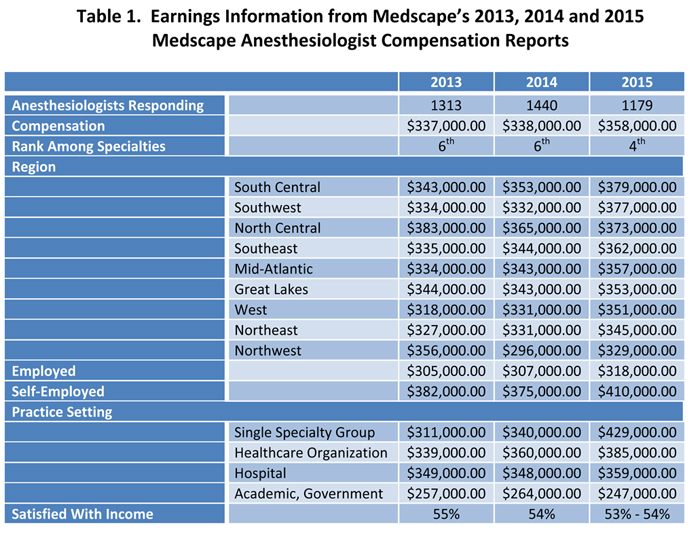- Joined
- Apr 22, 2007
- Messages
- 22,840
- Reaction score
- 9,893
- Points
- 9,821
- Location
- Southeast
- Attending Physician
Median compensation
Anesthesiologists: $416,563 (0.1 percent increase from 2015)
Cardiologists: $483,653 (6.9 percent increase from 2015)
Dermatologists: $434,520 (4.3 percent decrease from 2015)
Endocrinologists: $242,202 (0.1 percent increase from 2015)
Emergency room physicians: $355,280 (9.6 percent increase from 2015)
Family medicine physicians: $234,706 (3.9 percent increase from 2015)
Gastroenterologists: $505,194 (0.2 percent decrease from 2015)
General Surgeons: $413,824 (6 percent increase from 2015)
Internal medicine physicians: $249,588 (4 percent increase from 2015)
Neurologists: $284,751 (1.7 percent increase from 2015)
OB-GYN: $333,231 (3.6 percent increase from 2015)
Oncologists: $416,738 (2.4 percent increase from 2015)
Ophthalmologists: $385,149 (4.2 percent decrease from 2015)
Orthopedic surgeons: $582,056 (1.6 percent increase from 2015)
Pediatricians: $235,257 (0.7 percent increase from 2015)
Psychiatrists: $254,942 (3.4 percent increase from 2015)
Pulmonologists: $352,462 (4.9 percent increase from 2015)
Rheumatologists: $251,913 (1.9 percent increase from 2015)
Urologists: $441,836 (2 percent increase from 2015)
http://www.beckershospitalreview.co...tatistics-on-physician-compensation-2017.html
Anesthesiologists: $416,563 (0.1 percent increase from 2015)
Cardiologists: $483,653 (6.9 percent increase from 2015)
Dermatologists: $434,520 (4.3 percent decrease from 2015)
Endocrinologists: $242,202 (0.1 percent increase from 2015)
Emergency room physicians: $355,280 (9.6 percent increase from 2015)
Family medicine physicians: $234,706 (3.9 percent increase from 2015)
Gastroenterologists: $505,194 (0.2 percent decrease from 2015)
General Surgeons: $413,824 (6 percent increase from 2015)
Internal medicine physicians: $249,588 (4 percent increase from 2015)
Neurologists: $284,751 (1.7 percent increase from 2015)
OB-GYN: $333,231 (3.6 percent increase from 2015)
Oncologists: $416,738 (2.4 percent increase from 2015)
Ophthalmologists: $385,149 (4.2 percent decrease from 2015)
Orthopedic surgeons: $582,056 (1.6 percent increase from 2015)
Pediatricians: $235,257 (0.7 percent increase from 2015)
Psychiatrists: $254,942 (3.4 percent increase from 2015)
Pulmonologists: $352,462 (4.9 percent increase from 2015)
Rheumatologists: $251,913 (1.9 percent increase from 2015)
Urologists: $441,836 (2 percent increase from 2015)
http://www.beckershospitalreview.co...tatistics-on-physician-compensation-2017.html



